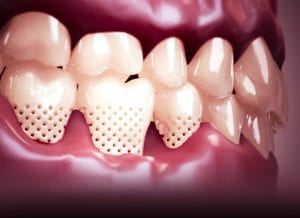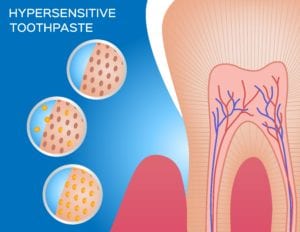Tips to Manage Hypersensitivity

As summer approaches, there are several cold summer treats that you may be craving such as ice cream, slushies, popsicles, and much more. However your teeth may not share the same feelings as you do when it comes to cold treats. In fact, some people may even experience a sudden and severe pain coming from deep inside their tooth while eating or drinking something cold. This is a phenomenon that is known as tooth sensitivity or tooth hypersensitivity.
What is tooth hypersensitivity?

Tooth sensitivity is when one or more teeth respond to hot, cold, or sweet foods and beverages by producing a painful sensation. This sensation is generally described as a sudden, deep pain felt on the inside of the tooth or deep in the jaw. In many cases, tooth sensitivity can be a symptom for a variety of dental conditions such as tooth decay, gum recession, a leaking restoration, worn enamel, or a pulp infection. Because of this, it is recommended to have a dentist examine your mouth if you are regularly experiencing tooth sensitivity.
In some cases, however, the teeth may be sensitive to hot, cold, and sweet temperatures without any apparent underlying cause. In these cases, teeth are generally described as being hypersensitive. This basically means that they experience a mild form of sensitivity when exposed to hot, cold, or sweet foods and beverages. If all potential causes of tooth sensitivity are ruled out, then you may simply have sensitive teeth.
What causes tooth sensitivity?
As mentioned above, tooth sensitivity can be caused by a variety of dental conditions. However, when none of these conditions are present, then tooth sensitivity is generally attributed to thin or worn enamel. The enamel is the outermost layer of your tooth and is responsible for protecting the inside of your tooth. As it wears down due to chewing, grinding, and the acids in foods, the inside of the tooth becomes exposed. Underneath the enamel, lies the dentin layer which is porous and contains several microscopic tubules that lead directly to the nerve.
How to Manage Tooth Hypersensitivity
Besides completely avoiding anything that is hot, cold, or sweet, many people with hypersensitivity want to know how they can manage their sensitive teeth. Here are a few ways to manage tooth hypersensitivity:

Sensitivity Toothpaste
There are a variety of over the counter toothpastes made for people with sensitive teeth. These toothpastes are specially formulated to decrease sensitivity in people who have sensitive teeth. For starters, many sensitivity toothpastes do not contain sodium lauryl sulfate (SLS) because this is often an ingredient that can irritate sensitive teeth and make symptoms worse. Additionally, sensitivity toothpastes also contain ingredients that help to fill the microscopic tubules in the dentin layer as a way of preventing nerve irritation. Ingredients that help reduce sensitivity include potassium nitrate, stannous fluoride, and strontium chloride. In some cases, you can also ask your dentist about prescription toothpastes that are specially formulated for sensitive teeth.
Fluoride Varnish
Another way to manage tooth sensitivity is to ask your dentist about fluoride varnish. Most dentists apply fluoride varnish after a semi-annual dental cleaning, however it may need to be applied to specific areas to prevent tooth sensitivity symptoms. Although this will not solve the problem, it will provide temporary relief from tooth sensitivity and help to strengthen the remaining enamel. Your dentist may also recommend other desensitizers such as oxalate or Gluma.
Cervical Restorations
These are restorations along the gum line that are used to restore sensitive teeth that are associated with gum recession or enamel erosion along the gum line. In most cases, composite resin is bonded to the tooth in order to cover up exposed dentin or worn enamel. The composite resin then acts as the protective layer and prevents stimuli from reaching the nerve, thus reducing sensitivity. In some cases, soft tissue procedures may also need to be performed to achieve the desired results.






Recent Comments